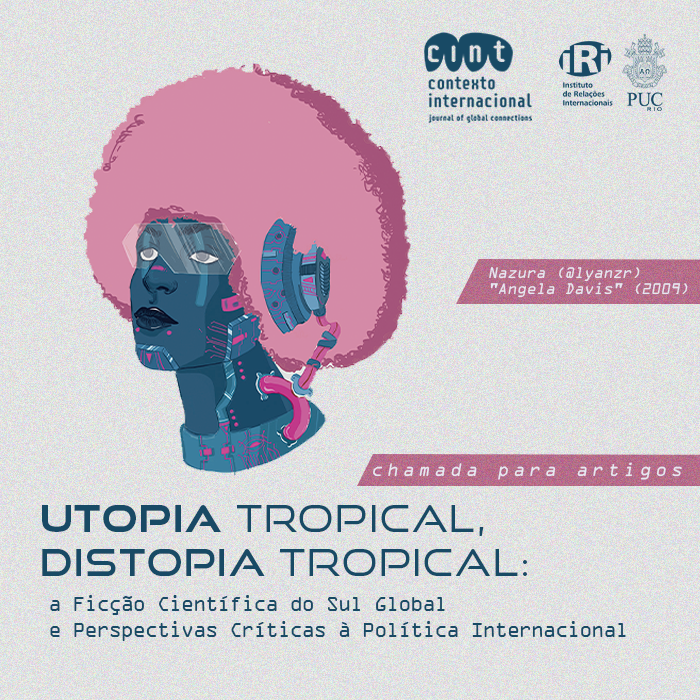After a long time being disregarded as minor genre of literature, Science Fiction (SF) has been recognized by renowned critics, writers, movie directors, and artists as a provocative, intriguing, and potentially abundant field for the exercise of sociopolitical analyses. Since the 1970s, social scientists have been using SF works to raise awareness of crucial debates such as climate change, political freedom, minority rights, global economic challenges, peace, and warfare. In the 1990s, Social Sciences’ cultural turn reached the discipline of International Relations opening an avenue for the connection between traditional and new topics of concern in IR with features from popular culture studies. SF was among the topics evoked from popular culture by contemporary IR theorists. Originally calling the attention of authors under Marxism and Critical Theory, the subject of SF quickly spread among theorists affiliated with different perspectives such as Feminism, Poststructuralism, Postcolonialism, and Gender Studies. The first wave of SF & IR Studies was mainly delivered by scholars based on the Global North and focused on the Global North SF production. This pattern, however, has been challenged by a vibrant Global South SF production followed by the emergence of an increasing interest of Global South scholars in SF works and, particularly, in Global South SF. Innovatively, this Special Issue seeks to represent a vehicle – a ‘spaceship’ or a ‘time-machine’ – for the gathering and the promotion of a community of IR scholars interested in addressing Global South realities by recurring to Global South SF’s body of work, its particularities and its analytical potential.
We are seeking to gather reflections from and for the Global South related to Global South Sci-Fi, its authors, and its themes. We understand ‘Global South’ in its broader definition as the set of societies established within Latin America, Africa, Asia, and Oceania, as well as minorities within the Global North that have been historically subjected by local political, ethnic, and/or economic classes or strata. It is our goal to present an original collection of papers on Sci-Fi and International Relations in the Global South to promote different and diverse critical approaches to the multiplicity of problematic situations and issues that challenge Global South societies. For peoples who are familiar with ‘surreal’ situations of violence, inequality, and political regimes – as well as vast diversity and richness of cultural and intellectual traditions – we believe that it is time to bring for the discipline of International Relations the contribution of Sci-Fi works of art produced and analyzed by ‘Global Southerners’ to build cognitive bridges among ourselves and between the Earth’s North and its vast South.
In view of the above, a non-exhaustive list of indicative themes that would be of interest for this call are:
- Connections between ‘mainstream’ science-fiction and colonialism and imperialism;
- The role of science-fiction in building the imaginary around the Global South;
- Science-fiction narratives (and counter-narratives) and their relation to the international, especially the Global South;
- The emergence of Global South Sci-Fi and IR;
- The “linguistic turn”, Sci-Fi, and the Global South;
- Postcolonial, feminist, and Marxist approaches in IR and Science-Fiction;
- Sci-Fi as a pedagogical tool for understanding Global South realities;
- Sci-Fi, IR futurisms, and the Global South.
Authors should submit their abstracts (up to 300 words) until June 30, 2022 to Contexto Internacional online system (https://mc04.manuscriptcentral.com/cint-scielo). The preselected authors will have until September 30, 2022, to submit the complete paper (also to https://mc04.manuscriptcentral.com/cint-scielo), which will be then go through CINT’s peer-reviewing process. All articles must be written in the English following the norms available at CINT’s Authors’ Guidelines (https://www.scielo.br/revistas/cint/iinstruc.htm).
Tropical Utopia, Tropical Dystopia: Global South Science Fiction and Critical Approaches to International Politics
Special Guest Editors: Thiago Rodrigues (Fluminense Federal University, Brazil), Fernanda Barasuol (Grande Dourados Federal University, Brazil), Thiago Borne (Santa Catarina Federal University, Brazil)
